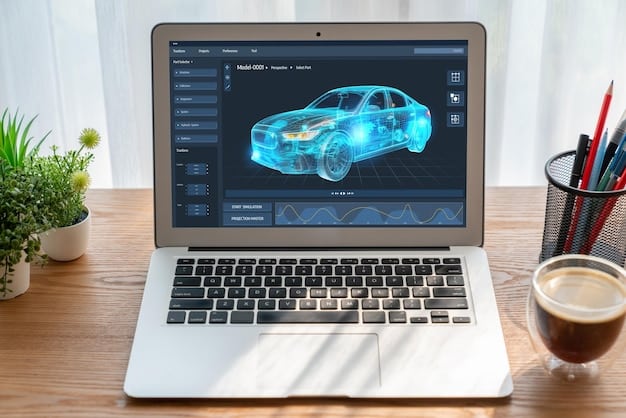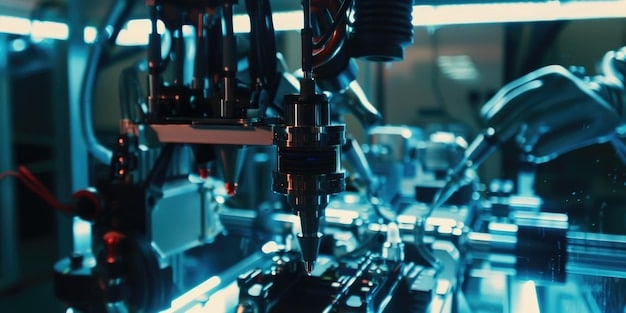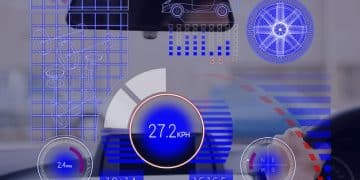AI in US Auto: Enhancing Vehicle Design & Performance

US auto manufacturers are increasingly leveraging artificial intelligence (AI) to revolutionize vehicle design and performance through enhanced simulations, personalized user experiences, optimized manufacturing processes, and the development of advanced driver-assistance systems.
The automotive industry in the United States is undergoing a significant transformation, driven by advancements in artificial intelligence. How are US auto manufacturers utilizing artificial intelligence to improve vehicle design and performance? This article explores the diverse applications of AI in the automotive sector, from streamlining design processes to enhancing vehicle capabilities and providing a more personalized driving experience.
AI-Driven Design and Simulation
Artificial intelligence is revolutionizing how US auto manufacturers approach vehicle design. AI algorithms enable engineers to explore countless design iterations, optimizing for factors such as aerodynamics, structural integrity, and fuel efficiency. This leads to faster development cycles and more innovative vehicle designs.
Optimizing Aerodynamics with AI
AI algorithms can analyze complex fluid dynamics simulations to identify areas for aerodynamic improvement. This helps auto manufacturers create vehicles that are more fuel-efficient and have better handling.
Enhancing Structural Integrity through AI
AI can also be used to simulate crash tests and identify potential weaknesses in a vehicle’s structure. This allows engineers to strengthen these areas, improving overall safety and crashworthiness.
- AI-powered generative design tools create lightweight yet strong components.
- Machine learning algorithms predict material performance under various conditions.
- Advanced simulation software reduces the need for physical prototypes.
By leveraging AI in design and simulation, US auto manufacturers can create vehicles that are safer, more efficient, and more appealing to consumers. This technology is essential for staying competitive in the rapidly evolving automotive market.

Personalized Driving Experiences with AI
AI is also playing a key role in creating more personalized driving experiences. From intelligent infotainment systems to adaptive driver assistance, AI is enhancing comfort, convenience, and safety for drivers and passengers.
Intelligent Infotainment Systems
AI-powered infotainment systems can learn a driver’s preferences and habits, providing customized recommendations for music, navigation, and other features. These systems can also respond to voice commands and natural language queries, making it easier to control vehicle functions while on the road.
Adaptive Driver Assistance Systems (ADAS)
AI is at the heart of advanced driver assistance systems (ADAS), which include features such as adaptive cruise control, lane keeping assist, and automatic emergency braking. These systems use sensors and AI algorithms to monitor the vehicle’s surroundings and take action to prevent accidents.
- AI algorithms personalize cabin settings like temperature and seating position.
- Predictive maintenance alerts drivers to potential issues before they become problems.
- AI-powered voice assistants offer seamless control over vehicle functions.
By personalizing the driving experience, US auto manufacturers can create vehicles that are more enjoyable and convenient to use. This helps build brand loyalty and attract new customers in a competitive market.
AI in Manufacturing and Quality Control
Beyond design and user experience, AI is also transforming manufacturing processes within the US auto industry. AI-powered robots and machine learning algorithms are improving efficiency, reducing waste, and enhancing quality control.
Robotics and Automation
AI-powered robots can perform repetitive tasks with greater speed and precision than human workers. This leads to increased production efficiency and reduced labor costs.
Predictive Maintenance
Machine learning algorithms can analyze data from manufacturing equipment to predict when maintenance is needed. This helps prevent breakdowns and minimize downtime.
- AI vision systems detect defects in real-time, ensuring higher quality standards.
- Optimized supply chain management reduces delays and inventory costs.
- Improved resource allocation minimizes waste and maximizes efficiency.
By leveraging AI in manufacturing and quality control, US auto manufacturers can produce vehicles at a lower cost and with higher quality. This provides a competitive advantage in the global automotive market.

AI for Autonomous Vehicle Development
One of the most exciting applications of AI in the automotive industry is the development of autonomous vehicles. AI algorithms are essential for enabling vehicles to perceive their surroundings, make decisions, and navigate without human intervention.
Sensor Fusion
Autonomous vehicles rely on a variety of sensors, including cameras, radar, and lidar, to perceive their surroundings. AI algorithms are used to fuse data from these sensors into a comprehensive understanding of the vehicle’s environment.
Decision Making and Path Planning
AI algorithms are also used to make decisions about how to navigate in complex and dynamic environments. This includes path planning, obstacle avoidance, and traffic management.
- Deep learning models enable vehicles to recognize and classify objects with high accuracy.
- Reinforcement learning algorithms train vehicles to navigate challenging scenarios.
- Simulated environments allow developers to test and refine autonomous driving systems.
While fully autonomous vehicles are not yet widely available, US auto manufacturers are investing heavily in AI research and development to bring this technology to market. Autonomous vehicles have the potential to revolutionize transportation, making it safer, more efficient, and more accessible.
Ethical Considerations and Challenges
As AI becomes more prevalent in the automotive industry, it is important to consider the ethical implications and potential challenges. This includes issues such as data privacy, algorithmic bias, and job displacement.
Data Privacy
AI-powered vehicles collect vast amounts of data about drivers and their driving habits. It is important to ensure that this data is protected and used responsibly.
Algorithmic Bias
AI algorithms can sometimes reflect biases present in the data they are trained on. This can lead to unfair or discriminatory outcomes.
- Addressing bias in training data requires careful curation and validation.
- Transparency and explainability are crucial for building trust in AI systems.
- Collaboration between industry, government, and researchers is essential for developing ethical AI guidelines.
Job Displacement
The automation of manufacturing processes and the potential for autonomous vehicles could lead to job displacement in the automotive industry. It is important to provide training and support for workers who may be affected by these changes.
By addressing these ethical considerations and challenges, the US auto industry can ensure that AI is used responsibly and for the benefit of society.
The Future of AI in US Auto Manufacturing
The integration of artificial intelligence into US auto manufacturing is poised to grow exponentially. The convergence of AI with other advanced technologies promises to reshape the industry landscape significantly.
Enhanced Predictive Maintenance
AI’s role in predictive maintenance is expected to deepen. By analyzing a broader range of data points, including real-time sensor data and historical performance records, AI systems will be capable of predicting equipment failures with greater accuracy. This will help manufacturers minimize downtime, optimize maintenance schedules, and reduce operational costs.
Hyper-Personalization of Vehicle Features
AI will enable auto manufacturers to offer hyper-personalized vehicle features tailored to individual driver preferences and needs. Through machine learning algorithms that analyze driving habits, environmental conditions, and user feedback, vehicles will adapt their settings, performance, and even safety features in real-time, creating a truly customized driving experience.
- AI-driven vehicle design will lead to more aerodynamic and fuel-efficient vehicles.
- AI will enhance safety features through real-time data analysis.
- AI will enable personalized driving experiences.
The future of US auto manufacturing is inextricably linked to the continued advancement and integration of artificial intelligence. As AI technologies evolve, they have the potential to not only enhance vehicle design and performance, but also to revolutionize manufacturing processes, personalize the driving experience, and drive the development of autonomous vehicles.
| Key Point | Brief Description |
|---|---|
| 🤖 AI-Driven Design | AI optimizes vehicle design for aerodynamics and safety. |
| 🚗 Personalized Experience | AI customizes infotainment and driver assistance. |
| 🏭 AI in Manufacturing | AI enhances quality control and predictive maintenance. |
| 🚦 Autonomous Driving | AI enables sensor fusion and decision-making for self-driving cars. |
Frequently Asked Questions
▼
AI optimizes vehicle design by simulating numerous iterations to improve aerodynamics, structural integrity, and fuel efficiency, leading to innovative and efficient designs.
▼
AI personalizes driving by adapting infotainment systems to driver preferences and enhancing driver assistance with features like adaptive cruise control and lane keeping assist.
▼
AI is used in auto manufacturing for robotics, predictive maintenance, and quality control. AI-powered robots perform tasks quickly, and predictive algorithms prevent equipment breakdowns.
▼
Ethical issues with AI in vehicles include protecting data privacy, addressing algorithmic bias, and mitigating job displacement due to automation and autonomous vehicles.
▼
AI is vital for autonomous vehicles, providing sensor fusion, decision-making, and path planning. It enables vehicles to understand surroundings and navigate without human input.
Conclusion
In conclusion, AI is transforming the US auto industry by enhancing design, personalizing experiences, improving manufacturing, and driving autonomous vehicle development. Addressing ethical considerations is crucial to fully realize the benefits of AI.





